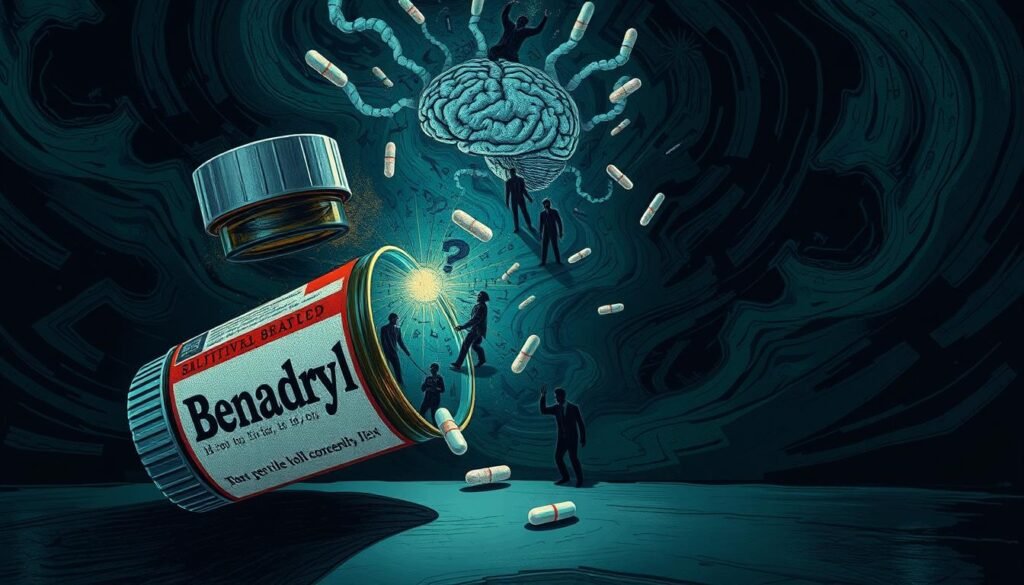About 19.1% of adults in the U.S. have anxiety disorders yearly. This shows a big issue with mental health in the country. People often turn to over-the-counter meds like Benadryl for help. But, can Benadryl actually make anxiety worse for some? We’ll look into if this common antihistamine might cause unease.
When asking if Benadryl can lead to anxiety, it’s key to know how it works. We’ll also see how it might unexpectedly affect mental health. Even though it’s mainly for allergies, Benadryl could harm mental well-being. Let’s explore how Benadryl might pose a risk for anxiety, looking at both body and mind effects.
Key Takeaways
- About 19.1% of U.S. adults are affected by anxiety disorders annually.
- Benadryl, while effective for allergies, may have paradoxical effects on anxiety levels.
- Understanding the interplay between antihistamines and mental health is crucial.
- Common side effects include sedation, which can impact mental clarity.
- Long-term use of Benadryl is associated with increased mental health risks.
Introduction to Benadryl and Anxiety
Benadryl is the trade name for diphenhydramine. It’s mainly used to treat allergy symptoms. Besides its main use, it’s known for having sedative effects. This can lead to a benadryl anxiety risk that might surprise users. About 32% of adults in the US have faced anxiety disorders at some point. This brings up concerns about how Benadryl affects those with anxiety.
The benefits of antihistamines like Benadryl for allergies are clear. However, it’s important to know about possible side effects, including anxiety. About 5% of Benadryl users, especially those with existing conditions, may experience anxiety. This highlights the importance of healthcare providers reviewing patients’ histories before prescribing it.
In studies, side effects like drowsiness affected nearly 40% of users. This is particularly problematic for those dealing with anxiety. Since Benadryl isn’t approved for anxiety treatment by the FDA, it’s essential to understand the risks and benefits. This knowledge is crucial for health and welfare.
Learning about Benadryl’s effects provides insights into its benefits and potential downsides. Deciding to use antihistamines for anxiety should be done carefully. Always seek advice from healthcare experts to make sure it’s safe.
What is Benadryl and How Does it Work?
Benadryl, also known as diphenhydramine, is a common antihistamine. It helps relieve allergic reactions and symptoms. It works by blocking histamine, a body substance that causes sneezing, itching, and a runny nose. People often use Benadryl for fast relief, feeling better within 30 minutes.
Benadryl comes in tablets, capsules, and liquid forms. Adults and children 12 years and up should take 25 to 50 milligrams every 4 to 6 hours. The daily limit is 300 mg. For kids 6 to 11 years old, the dosage is 12.5 to 25 mg every 4 to 6 hours.
However, Benadryl has risks. About 30% of users experience drowsiness. Other side effects include dizziness, dry mouth, and upset stomach. These can lead to significant benadryl adverse reactions, especially in older adults.
On rare occasions, it may cause severe reactions like confusion or a rapid heartbeat. Knowing these risks is essential for safe use, especially if you have existing health issues.
Can Benadryl Cause Anxiety?
Many people use Benadryl, an over-the-counter antihistamine, to relieve symptoms of allergies and colds. It works well for sneezing and a runny nose. But, some people find it makes their anxiety worse. This surprising effect makes us wonder if Benadryl can cause anxiety.
Understanding Paradoxical Effects of Benadryl
Paradoxical excitation happens when a drug does the opposite of what’s expected. For Benadryl, this means it might cause symptoms like restlessness and nervousness, especially in those with anxiety disorders. It’s thought that genetic differences affect how Benadryl is processed, leading to these unexpected reactions. More information is available here.
Symptoms Associated with Anxiety After Taking Benadryl
Benadryl can lead to symptoms such as:
- Increased heart rate
- Restlessness
- Paranoia
- Confusion
- Impaired motor skills
Some reports have linked Benadryl use with severe anxiety or hallucinations, especially if too much is taken. These effects highlight why knowing the risks of this medication is key. Talking to a healthcare provider is important if you experience negative effects. Alternative anxiety treatments are discussed here.
Side Effects of Benadryl: An Overview
Benadryl helps with allergy symptoms but has side effects. Knowing the side effects of Benadryl is key for its users. Side effects range from common to serious, with the serious ones needing quick help.
Common Side Effects of Benadryl
Users may face minor side effects like:
- Drowsiness
- Dizziness
- Dry mouth
- Fatigue
- Disturbed coordination
Drowsiness is common, especially in adults. Yet, some kids might feel more awake, which is not the usual effect.
Serious Side Effects to Watch For
The serious side effects of Benadryl shouldn’t be ignored. They include:
- Sudden vision loss
- Severe headaches
- Confusion
- Irregular or fast heartbeat
- Painful or difficult urination
In worst cases, an overdose can be deadly. It’s vital to get medical help fast. This is especially true for kids and those with health issues.

The Connection Between Antihistamines and Anxiety
Antihistamines are mainly used for allergies. Yet, they also have a link with anxiety. People often feel anxious after taking older antihistamines like diphenhydramine. These drugs can make you tired, which may lead to feeling more anxious.
Newer antihistamines, such as loratadine and cetirizine, usually don’t cause sleepiness. This means they’re less likely to make you anxious. However, mixing them with other drugs can increase anxiety risks. This can lead to feeling very anxious.
If you’re prone to anxiety, talk to a doctor before taking antihistamines. Stopping them suddenly can cause withdrawal. This includes anxiety, which might feel like a panic attack. You might also feel sick, can’t sleep well, and get irritable and restless.
Using antihistamines a lot can change your brain chemicals. This affects your mood after you stop taking them. Becoming dependent on them can make stopping harder. You might feel confused, get a dry mouth, or have trouble seeing. This situation shows why treating both mind and body is key. This includes detox under medical watch and therapy.
| Medication Type | Potential for Anxiety | Common Withdrawal Symptoms |
|---|---|---|
| Older Generation | Higher | Nausea, Insomnia, Restlessness |
| Newer Generation | Lower | May include mild anxiety |
Who is at Higher Risk of Anxiety from Benadryl?
Knowing who gets more anxious from Benadryl helps us understand its risks better. Both kids and older adults need more attention with this medication. They may experience more anxiety from Benadryl than others.
Children and Benadryl: A Unique Sensitivity
Benadryl can affect children differently. Parents should watch for unusual behaviors like hyperactivity. This unexpected reaction raises anxiety risks in young ones. Benadryl isn’t recommended for kids under 6. This makes it important to talk to doctors first.
Older Adults and the Risk of Adverse Effects
Older people also face a higher risk with Benadryl. Side effects can turn serious for them, causing anxiety and confusion. Studies link long-term use to dementia risks. So, it’s crucial to weigh the dangers for seniors carefully.

Managing Anxiety Symptoms Related to Benadryl Use
Taking Benadryl for anxiety can cause complex feelings. It’s key to use strategies to ease any anxiety. These methods can create a calm effect, boosting well-being.
Strategies for Alleviating Anxiety
Here are some ways to lessen anxiety from Benadryl:
- Controlled Breathing: Slow, deep breaths can calm the mind and body. This reduces panic feelings.
- Regular Exercise: Physical activities release happy chemicals. They lift your mood and lower stress.
- Relaxation Techniques: Activities like meditation or yoga can greatly cut down anxiety. They bring peace.
Track how you react to Benadryl when using it for anxiety. Some might feel better for a while. But others could get more anxious or have panic attacks. If anxiety gets worse, it’s key to talk to a doctor.
When to Seek Medical Advice
See a doctor if you have:
- Severe anxiety or panic attacks after taking Benadryl.
- Prolonged side effects, like being too sleepy or confused.
- Any new or strange symptoms with Benadryl use. Especially if they disrupt daily life.
Getting advice from a doctor is important. They can suggest treatments and give advice. Knowing how Benadryl impacts your anxiety is crucial for your health. For more info, check out this resource on medication and anxiety.
Alternatives to Benadryl for Allergy Relief
If you need relief from allergies but worry about the potential risks of taking benadryl, there are safer and more effective options. Non-drowsy antihistamines, such as loratadine (Claritin) and cetirizine (Zyrtec), offer significant allergy relief. These do not cause the sleepiness that first-generation antihistamines do.
First-generation antihistamines can cause drowsiness, less coordination, and, in severe cases, symptoms of overdose. However, second-generation antihistamines like cetirizine or loratadine have a better safety profile. Compared to options like diphenhydramine (Benadryl), these have a much lower risk of mild drowsiness, affecting up to 10% of users.
Corticosteroid nasal sprays like Mometasone (Nasonex) and Fluticasone (Flonase Allergy Relief) are great for managing nasal allergies. They prevent symptoms without causing the sleepiness that oral antihistamines can.

For those with specific allergies, like dust mites or pollen, sublingual immunotherapy (SLIT) is a good choice. It involves allergen extracts to slowly reduce sensitivity over time. This offers long-lasting relief.
It’s important to know the side effects of each alternative, especially for kids and older adults. Those with health issues like heart disease or diabetes should talk to their doctor before trying new meds. Looking into alternatives to Benadryl means you can find a more personalized way to manage allergies.
To understand more about Benadryl’s potential to cause anxiety and other side effects, see this health resource.
Potential Risks of Long-Term Benadryl Use
Using Benadryl for a long time has some worrying effects on mental health and brain function. This over-the-counter antihistamine might work differently if you take it too much. Many people don’t realize how serious the long-term dangers of Benadryl can be. They depend on it without knowing the risks.
Impact on Mental Health and Cognitive Function
Taking Benadryl for a long period can cause mental health problems. It includes a higher risk of cognitive decline, especially in the elderly. Research shows a link between using anticholinergic drugs for a long time and a greater risk of dementia. Over ten years, taking 1,095 daily doses might increase dementia risk by 50%. Even using Benadryl for a short time can affect memory. It can cause immediate issues, and using it for a long time can make it worse. This means we need to be careful about relying on Benadryl.
Dependence and Withdrawal Symptoms
Regular use of Benadryl can lead to dependence. This means people may struggle to go without it. Stopping the drug can result in withdrawal symptoms, including anxiety. These can harm a person’s mental health. The American Geriatrics Society warns older adults not to use Benadryl. They’re at a bigger risk. Knowing these dangers can help people decide better about their health and treatment.
| Risk Factor | Description | Impact on Health |
|---|---|---|
| Cognitive Decline | Long-term use associated with dementia and memory impairment | Increased risk of Alzheimer’s disease |
| Benadryl Dependence | Reliance on the medication for regular function | Anxiety and other withdrawal symptoms upon cessation |
| Side Effects | Increased risks such as dizziness and low blood pressure | Potential for serious cardiovascular issues |
Conclusion
The link between Benadryl and anxiety is not simple. It deserves careful thought. It’s vital for those using Benadryl for allergies or other reasons to understand the benadryl anxiety risk. While it can ease symptoms like allergies, Benadryl might lead to anxiety in some people. This is especially true for older adults who are more sensitive to its side effects.
Users should think about the pros and cons of Benadryl. It’s important to know it can cause cognitive problems and dependence. Studies show that around 15% of negative reactions involve psychiatric symptoms, including anxiety. To learn more about avoiding dependency, check Foundation to Freedom.
It’s wise to talk to healthcare experts about Benadryl and your health. Being well-informed helps you make smart choices for your health. You have to consider both the immediate relief and your long-term wellbeing.